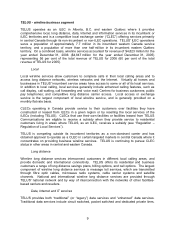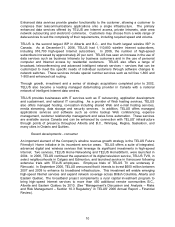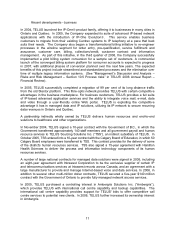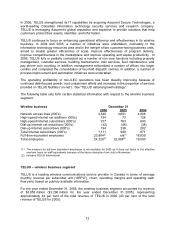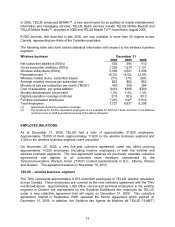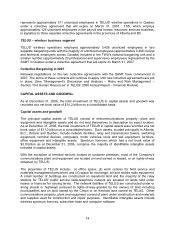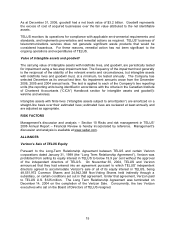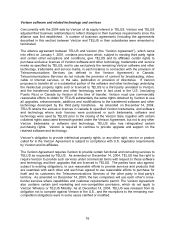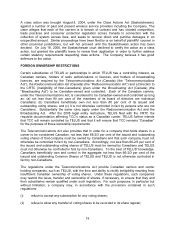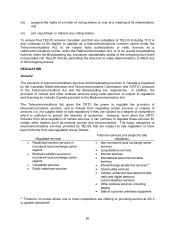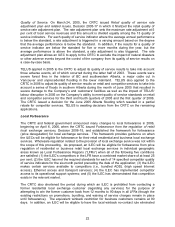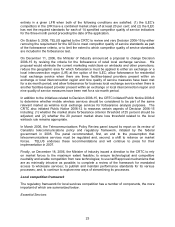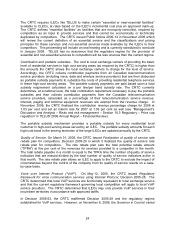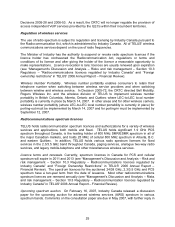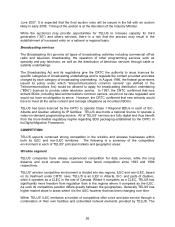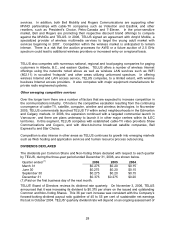Telus 2006 Annual Report Download - page 20
Download and view the complete annual report
Please find page 20 of the 2006 Telus annual report below. You can navigate through the pages in the report by either clicking on the pages listed below, or by using the keyword search tool below to find specific information within the annual report.A class action was brought August 9, 2004, under the Class Actions Act (Saskatchewan),
against a number of past and present wireless service providers including the Company. The
claim alleges that each of the carriers is in breach of contract and has violated competition,
trade practices and consumer protection legislation across Canada in connection with the
collection of system access fees, and seeks to recover direct and punitive damages in an
unspecified amount. Similar proceedings have been filed by or on behalf of plaintiffs’ counsel in
other provincial jurisdictions, but will not proceed until the Saskatchewan action has been
decided. On July 18, 2006, the Saskatchewan court declined to certify the action as a class
action, but granted the plaintiffs leave to renew their application in order to further address
certain statutory requirements respecting class actions. The Company believes it has good
defences to the action.
FOREIGN OWNERSHIP RESTRICTIONS
Certain subsidiaries of TELUS or partnerships in which TELUS has a controlling interest, as
Canadian carriers, holders of radio authorizations or licences, and holders of broadcasting
licences, are required by the Telecommunications Act (Canada) (the “Telecommunications
Act”), the Radiocommunication Act (Canada) (the “Radiocommunication Act”) and a Direction to
the CRTC (Ineligibility of Non-Canadians) given under the Broadcasting Act (Canada) (the
“Broadcasting Act”) to be Canadian-owned and controlled. Each of the Canadian carriers,
under the Telecommunications Act, is considered to be Canadian-owned and controlled as long
as: (a) not less than 80 per cent of the members of its board of directors are individual
Canadians; (b) Canadians beneficially own not less than 80 per cent of its issued and
outstanding voting shares; and (c) it is not otherwise controlled in fact by persons who are not
Canadians. Substantially the same rules apply under the Radiocommunication Act and the
Broadcasting Act. After the 2006 legal entity restructure, TELUS filed with the CRTC the
requisite documentation affirming TCC’s status as a Canadian carrier. TELUS further intends
that TCC will remain controlled by TELUS and that it will ensure that TCC remains “Canadian”
for the purposes of these ownership requirements.
The Telecommunications Act also provides that in order for a company that holds shares in a
carrier to be considered Canadian, not less than 66-2/3 per cent of the issued and outstanding
voting shares of that company must be owned by Canadians and that such company must not
otherwise be controlled in fact by non-Canadians. Accordingly, not less than 66-2/3 per cent of
the issued and outstanding voting shares of TELUS must be owned by Canadians and TELUS
must not otherwise be controlled in fact by non-Canadians. To the best of TELUS’ knowledge,
Canadians beneficially own and control in the aggregate not less than 66-2/3 per cent of the
issued and outstanding Common Shares of TELUS and TELUS is not otherwise controlled in
fact by non-Canadians.
The regulations under the Telecommunications Act provide Canadian carriers and carrier
holding companies, such as TELUS, with the time and ability to rectify ineligibility resulting from
insufficient Canadian ownership of voting shares. Under these regulations, such companies
may restrict the issue, transfer and ownership of shares, if necessary, to ensure that they and
their subsidiaries remain qualified under such legislation. For such purposes, in particular but
without limitation, a company may, in accordance with the provisions contained in such
regulations:
(i) refuse to accept any subscription for any voting shares;
(ii) refuse to allow any transfer of voting shares to be recorded in its share register;
19


